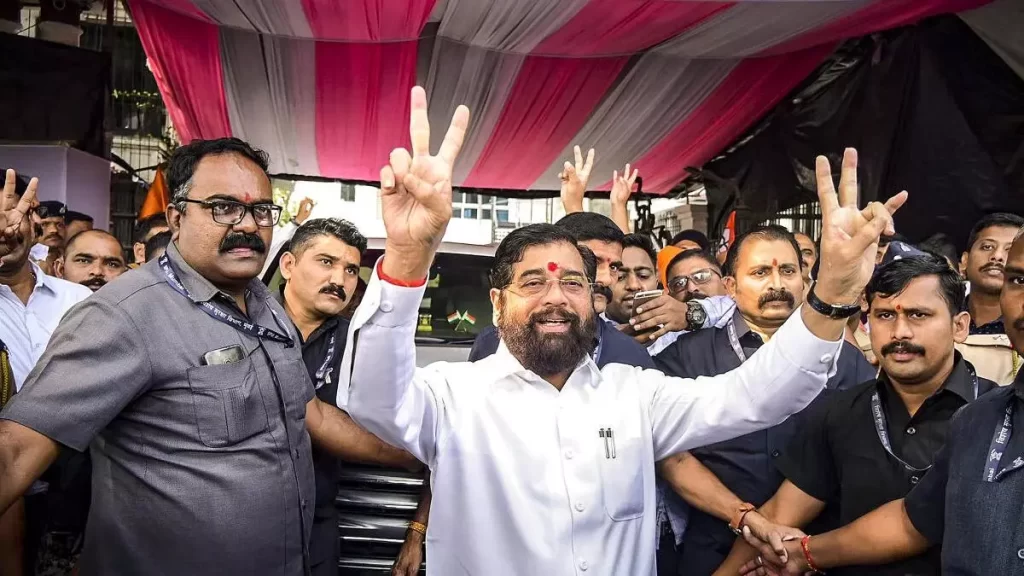Maharashtra Assembly Election Results: A Historic Shift in Politics
The highly anticipated Assembly elections in Maharashtra have unfolded with unexpected clarity, shifting from a competitive contest to a decisive victory for the BJP-led Mahayuti alliance, which includes Shiv Sena, the Nationalist Congress Party (NCP), and several smaller parties. At the time of reporting, the Mahayuti alliance was projected to win or lead in 231 out of 288 seats, while the opposing coalition secured a mere 49. Notably, the BJP has crossed the three-digit benchmark independently for the third consecutive election cycle. Both Eknath Shinde’s Shiv Sena and Ajit Pawar’s NCP demonstrated resilience, rebounding from prior Lok Sabha setbacks.
The Maha Vikas Aghadi faced a stunning defeat, casting doubts on the future viability of both the Shiv Sena (led by Uddhav Thackeray) and the NCP (led by Sharad Pawar). The Congress Party’s performance marked its weakest historical showing. These results signal a potential realignment of political dynamics in Maharashtra, with implications for governance and the state’s ongoing sociopolitical evolution.
A Victory for Development
“This is a resounding victory for Mahayuti. Many counted us out after the Lok Sabha elections, but the people’s faith in our development initiatives has prevailed, particularly with schemes like Ladki Bahin,” declared Chief Minister Eknath Shinde. The Ladki Bahin initiative, launched in August 2024, provided financial assistance of Rs. 7,500 to 2.34 crore women over five months. In a state with 4.60 crore women voters, this targeted outreach was crucial. The government allocated a staggering Rs. 17,000 crore directly to women beneficiaries, establishing a strong connection with a vital voter demographic.
Key Campaign Initiatives
In addition to the transformative impact of the Ladki Bahin scheme, other welfare measures were instrumental in securing the Mahayuti’s victory. These included waiving Rs. 15,000 crore in electricity bills for farmers and providing Rs. 2,500 crore in subsidies for soybean and cotton growers. The Mahayuti’s campaign also effectively employed the themes of “Ek Hai Toh Safe Hai” and “Vote Jihad” which resonated widely with the electorate. BJP leaders criticized the earlier accolades for the MVA, suggesting that Muslim voter consolidation had falsely elevated their standings. Slogans from Uttar Pradesh Chief Minister Yogi Adityanath and Prime Minister Narendra Modi galvanized support, reinforcing the BJP’s narrative and energizing its base. Kirit Somaiya aptly described this outcome as a victory of “Dharma Yuddha over Vote Jihad.”
Implications for Social Discourses
Political analyst Padmabhushan Deshpande remarked, “This victory could represent a pivotal moment in Maharashtra’s social discourse.” Historically, politicians have drawn on figures like King Shahu, Mahatma Phule, and Dr. Babasaheb Ambedkar to connect with progressive societal values. However, this recent triumph, characterized by an openly communal campaign, has the potential to reshape Maharashtra’s political landscape. Just as Madhya Pradesh has emerged as a stage for Hindutva politics, Maharashtra may now follow a similar trajectory.
The Maratha reservation issue also played a crucial role in shaping the electoral discourse. Although Mahayuti faced losses in 12 constituencies during the Lok Sabha elections due to this matter, it successfully countered Maratha protest leader Manoj Jarange-Patil’s call to oppose them by rallying non-Maratha Hindu voters, effectively implementing what has been dubbed the “Ma-Dha-Va formula”—uniting the Mali, Dhangar, and Vanjari communities.
Prime Minister Modi during a public meeting for the Lok Sabha election, in Pune with Chief Minister Eknath Shinde and Deputy Chief Ministers Devendra Fadnavis and Ajit Pawar. The Ladki Bahin scheme, which provided Rs. 7,500 to 2.34 crore women, emerged as a game-changer while the opposition MVA alliance suffered its worst defeat ever. | Photo Credit: ANI
Looking Ahead: The Path for the Mahayuti
The victory encourages new discussions regarding Maharashtra’s political future. The BJP, having campaigned under the banner of the “BJP-led Mahayuti,” now faces critical decisions regarding its leadership, particularly whether to maintain Eknath Shinde as Chief Minister or appoint one of its own. This decision could influence upcoming local elections, including the significant contest in Mumbai, with sensitivity required to ensure Shinde’s political viability, whether at the state or central level. However, Deputy Chief Minister Devendra Fadnavis reassured constituents of a collaborative decision-making process involving Eknath Shinde, Ajit Pawar, and the BJP high command regarding the Chief Minister position.
Challenges for the Opposition
The opposition, primarily comprised of Shiv Sena (Uddhav Thackeray) and NCP (Sharad Pawar), faces a daunting challenge moving forward. They must navigate an existential crisis that threatens their unity against an imposing BJP front. The Congress Party, particularly, needs to undertake a comprehensive rebuild of its organization while nurturing new leadership in Maharashtra to adapt to the changing political landscape. The implications of these election results also extend to the INDIA bloc, potentially undermining Congress’s key agenda points, such as constitutional protections and caste census.
More than Just Numbers
The defeat of the MVA goes beyond mere numbers, reflecting a deeper narrative. Several key figures, including Congress veterans Balasaheb Thorat and Ruturaj Patil, faced defeats, while others, such as NCP’s Rohit Pawar, managed to secure their positions. The Mahayuti alliance demonstrated formidable performances by leaders including Eknath Shinde, Devendra Fadnavis, and Ajit Pawar, alongside multiple candidates from the BJP and affiliated parties.
The electoral outcome presents a fresh challenge for the MVA regarding the Leader of the Opposition post. Given that parliamentary rules stipulate an opposition party must hold at least 10 percent of the assembly’s strength—28 seats in Maharashtra—MVA’s Shiv Sena (UBT), with only 20 seats, may find itself without a designated leader in the assembly. An indicative statement from Fadnavis hints at a reluctance from the ruling alliance to accommodate the opposition’s situation.
Since 2019, Maharashtra has experienced significant political instability, with dips in political discourse standards. The clear majority achieved by Mahayuti in 2024 minimizes speculation surrounding weak governance and corruption allegations. This decisive mandate brings high expectations: the Mahayuti must leverage its newfound political capital constructively to address the pressing needs of Maharashtra, validating the trust the electorate has placed in them.


